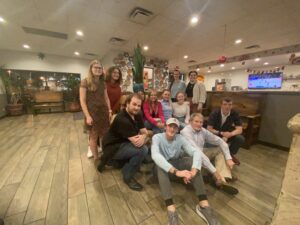Despite today’s widely deemed “unprecedented” battles with the coronavirus, economic hardship and civil unrest, the country’s well-documented history indicates these issues are new to the generation but not to the nation. Undeniably, elements of today’s center stage issues are entirely unique to 2020 — the coronavirus being one — but the challenges of racial inequality, financial disasters, political corruption, widespread sickness and other issues historically pre-date even the oldest living citizens today.
The presidential election is less than two weeks away. Whichever candidate is elected as the next commander in chief will serve a divided nation in desperate need of unity. No example in U.S. history can better illustrate the weight of nationwide division resting on a president’s shoulders than Abraham Lincoln. In 1862, the Civil War raged on and the Union was struggling. As radical Republicans began turning on Lincoln and the Northern generals deliberately disobeyed the president’s orders, hope was in short supply. Lincoln feared that he could no longer issue emancipation as it might fail to free slaves and instead result in political suicide, national division and the loss of support from Northern soldiers.
When things seemed their worst, Lincoln’s humanity was shown in conversation with a friend:
“They wish to get rid of me, and I am sometimes half disposed to gratify them. Since I heard last night of the proceedings of the caucus, I have been more distressed than by any event in my life … We are now on the brink of destruction. It appears to me that the Almighty is against us, and I can hardly see any ray of hope.”
Lincoln’s courage and perseverance resulted in the Civil War’s eventual conclusion and the historic emancipation of African American slaves. Furthermore, his actions served as a timeless testament to the idea that not only is unity possible in the most divisive of times, but it is always a noble ambition worthy of tireless pursuit.
Out of the 17 most noteworthy economic recessions, the Bureau of Labor Statistics and Bureau of Economic Analysis states that the Great Depression was the worst economic period in U.S. history. Beginning in 1929, the Depression’s impact would include, “A third of all banks failed. Unemployment rose to 25% … Housing prices plummeted 67%, international trade collapsed by 65%,” according to data published in the Balance.
Today’s economic issues are severe, but the Bureau of Labor Statistics’ most recent data shows a 7.9% unemployment rate, which pales in comparison to that during the Depression. After the 5-year economic crises ended, largely due to the New Deal enacted by F.D.R., American resilience proved yet again a powerful force in the face of adversity. Surprisingly, notable innovations such as the car radio, the electric razor and the tampon were all either developed or first marketed during the Great Depression. There may be no better way to characterize the American spirit than through the past’s record of defying insurmountable odds, meeting the challenges of history’s most catastrophic obstacles and progressing in hopes of building a truly equal and truly free nation.
The latest data from Johns Hopkins University & Medicine shows the coronavirus has claimed the lives of 221,930 Americans while producing a national state of economic and political uncertainty. While no single virus has been quite as politicized as the coronavirus or produced the same far-reaching effects, aspects of the current health crisis are comparable to some in the nation’s past. 1918’s influenza pandemic was globally devastating. Lasting two years, the sickness, caused by an H1N1 virus embedded with traces of bird DNA, infected an estimated “500 million people or one-third of the world’s population,” and killed an estimated “50 million worldwide with about 675,000 occurring in the United States,” according to the Centers for Disease Control.
The 1918 pandemic and the 2020 pandemic share some similarities. For starters, even the more disastrous projections of the 2020 pandemic do not come close to reaching the 1918 pandemic’s level of damage. One of the more frequently cited projections from Massachusetts Institute of Technology estimates global deaths could reach 2,010,000 by March 2021. Without downplaying the severity of COVID-19, it is imperative that people look to history before resorting to panic. Outrage over President Trump’s positive COVID-19 test may have been lessened had people looked to history. During negotiations to end World War I at the Versailles Peace Conferences in April 1919, former President Woodrow Wilson collapsed. Many historians and people living at the time believed it was from influenza, which was spreading rapidly through Paris.
History only proves useful when it is known. When we fail to know history, the suffering and sacrifice of the past were for nothing. Speaking volumes of truth, the famous Italian diplomat Niccolò Machiavelli said, “whoever wishes to foresee the future must consult the past; for human events ever resemble those of preceding times.”











Be First to Comment